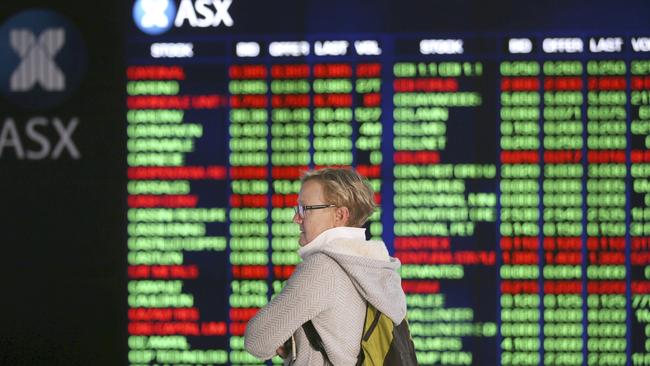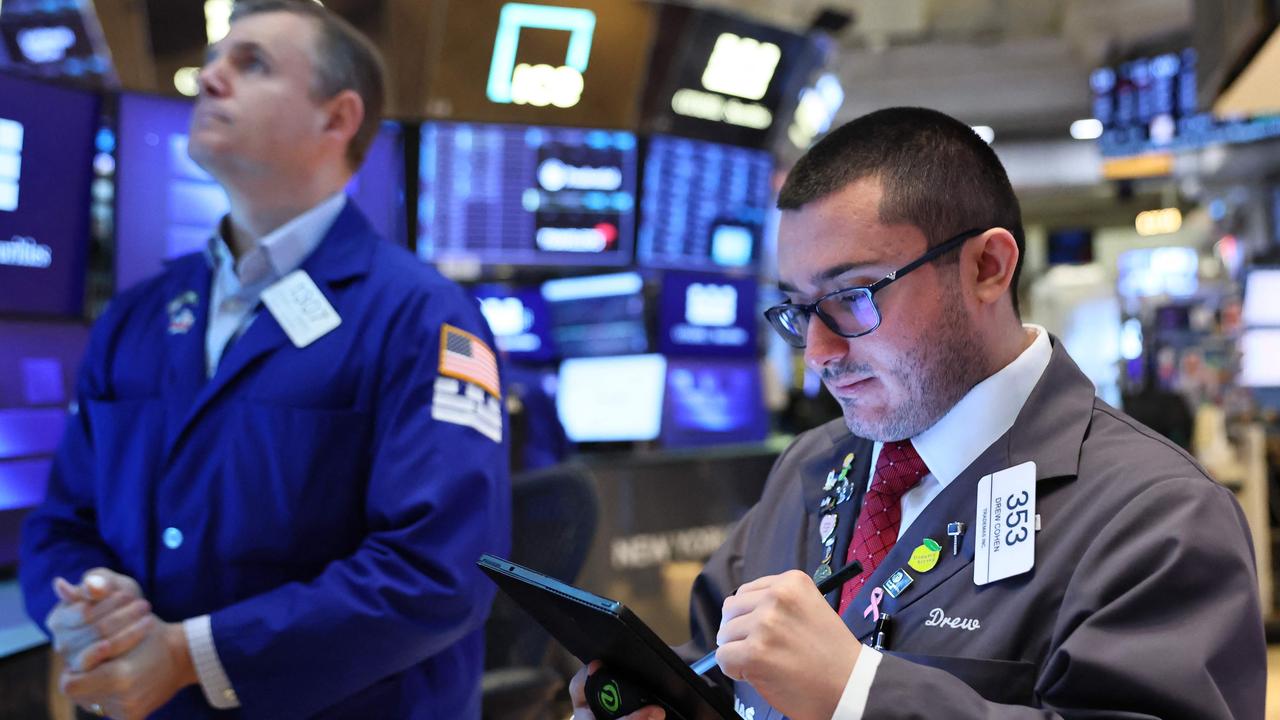Donald Trump trade threat spooks markets
The ASX sank and Asia markets plunged after Donald Trump tweets threatened to upset China trade talks.

Australian stocks sank and Asian markets plunged after Donald Trump threatened to hike tariffs on Chinese imports, potentially derailing high-level trade talks.
US futures dropped, oil prices fell and European markets also opened sharply lower after the apparent revival of trade tensions between China and the US.
The moves follow months of relatively tranquil and generally rising global markets, and show that investors remain sensitive to the potential of deteriorating relations between the world’s two largest economies.
In Australia, the S&P/ASX200 closed down 52.101 points, or 0.82 per cent, to 6283.699 points - its biggest one-day fall in four weeks.
The broader All Ordinaries index lost 57.302 points, or 0.89 per cent, to 6369.898 points.
On Asian markets, China’s Shanghai Composite closed down 5.6 per cent to post its biggest drop since February 2016 in the wake of the US President’s tweets flagging tariff hikes on $US200 billion ($286bn) of Chinese imports.
The Shanghai falls pushed the Chinese index into correction territory and China yuan took a battering.
....of additional goods sent to us by China remain untaxed, but will be shortly, at a rate of 25%. The Tariffs paid to the USA have had little impact on product cost, mostly borne by China. The Trade Deal with China continues, but too slowly, as they attempt to renegotiate. No!
— Donald J. Trump (@realDonaldTrump) May 5, 2019
Mr Trump’s move was apparently aimed at pressuring China to reach a trade deal, but may cast a shadow over the next round of negotiations.
China could be now considering cancelling trade talks, according to reports.
Later, Beijing said a Chinese trade team was still preparing to head to Washington for negotiations, despite Mr Trump’s threat.
“We are currently working on understanding the situation,” said foreign ministry spokesman Geng Shuang during a regular newsbriefing.
Australia, like other markets, felt the force of renewed trade tensions.
“It was kind of the opposite of what we’d heard in recent times, the market had been quite optimistic,” said CommSec market analyst Steven Daghlian.
“There had been signs from officials on both sides suggesting that they’re getting very close to a deal and by Friday this week they might actually put their differences aside and sign on the dotted line, so this was quite a surprise for the market.
“It was meant to be a pretty strong week to our market because we had a strong lead from Wall Street on Friday and there was a stronger read on unemployment data in the US as well.”
Eli Lee, head of investment strategy at Bank of Singapore, said: “Risks have clearly increased and we see a one-in-three chance that the Sino-US trade talks break down.”
He said threats from the US side could be negotiating tactics to exert maximum pressure before the coming talks, but Mr Trump could be inclined to walk away from a deal if it didn’t benefit him politically.
In its worst fall since the 2016 plunge, the benchmark Shanghai Composite Index fell 5.58 per cent, or 171.88 points, to 2,906.46, while the Shenzhen Composite Index,which tracks China’s second exchange, plummeted 7.38 per cent, or 120.79 points, to 1,515.80.
Hong Kong tumbled 3.2 per cent, Singapore was off 3.1 per cent and Taipei shed 1.8 per cent.
Japan’s Nikkei was closed due to a public holiday.
Mr Trump had stoked “risk aversion and panic emotions” in markets, said Qian Qimin, an analyst with Shenwan Hongyuan Securities inShanghai.
Mr Qian said Chinese shares could fall further in coming days but “should stabilise soon.”
In Australia, Rio Tinto fell 0.5 per cent to $93.94 while BHP lowered 0.4 per cent to $36.80.
In financials, Westpac underperformed its peers, dropping 1.2 per cent to $27.11 on a disappointing interim result.
Commonwealth Bank edged 0.1 per cent lower to $74.94. ANZ made 0.5 per cent to $27.55 while NAB added 1 per cent to $25.92.
Macquarie dropped 2.5 per cent to $125.62 after warning on its fiscal year 2020 result, despite booking a record profit figure on Friday.
Infant formula producer Bubs shot up 11.3 per cent to $1.48 after the company announced a partnership with Fonterra to produce a range of organic milk products.
Embattled franchisor Retail Food Group plunged 8.9 per cent to 21 cents after it took products off the shelves of its Michel’s Patisserie stores after reports it was selling products past their use-by date.
Elsewhere, Tasmanian fish farmer Huon Aquaculture tumbled 4.8 per cent to $4.34 after it flagged a hit to full-year earnings due to warmer temperatures as well as a jellyfish bloom which triggered high fish mortality rates. Rival Tassal dropped 6.1 per cent to $4.75.
The energy sector lowered despite a slight uptick in oil prices on Friday night after strong economic data out of the US boosted demand hopes.
Woodside Petroleum shed 0.5 per cent to $34.74 while Oil Search backtracked 1.2 per cent to $7.53. Santos slipped 1.2 per cent to $6.88 while Origin Energy fell 1.5 per cent to $7.41.
Gold miners were among the best performers after gold futures clawed their way back from a four-month low on Monday.
Newcrest edged up 0.3 per cent to $24.72 while Northern Star put on 0.5 per cent to $8.21. Evolution Mining stepped up 0.7 per cent to $3.09 while Regis Resources climbed 2.5 per cent to $4.45.
The Australian dollar was trading slightly higher at US69.89c in late trade.




To join the conversation, please log in. Don't have an account? Register
Join the conversation, you are commenting as Logout